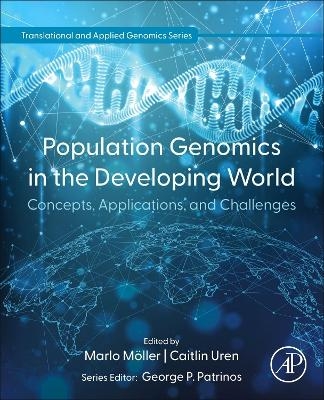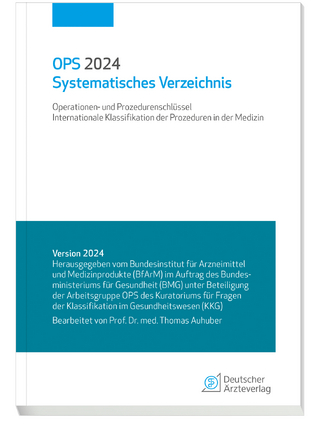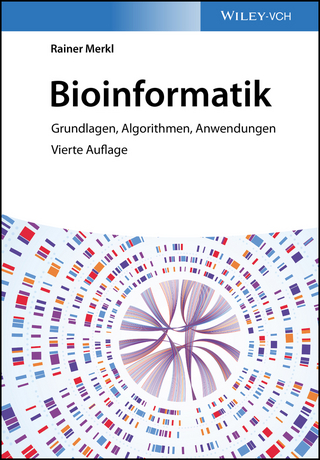
Population Genomics in the Developing World
Academic Press Inc (Verlag)
978-0-443-18546-5 (ISBN)
- Noch nicht erschienen (ca. November 2024)
- Versandkostenfrei innerhalb Deutschlands
- Auch auf Rechnung
- Verfügbarkeit in der Filiale vor Ort prüfen
- Artikel merken
Dr. Marlo Möller's primary research focuses on finding the genetic underpinnings of tuberculosis (TB). She developed an interest in this field at the beginning of her postgraduate degrees and continued this focus throughout her postdoctoral studies. She is currently an Associate Professor at Stellenbosch University, in Stellenbosch, South Africa. Her investigations into the genetic contribution of the human host to individual and population susceptibility to tuberculosis include tuberculous meningitis, tuberculosis resisters, the role of ancestry in tuberculosis disease, and primary immunodeficiencies. Dr. Möller's work leverages the complex ancestry of the admixed people in South Africa, specifically the unique genetic contribution from hunter–gatherer ancestry, to find novel genes and pathways involved in TB resistance and susceptibility. Dr. Caitlin Uren currently works in the fields of human population genetics, bioinformatics, and communicable and noncommunicable diseases. Her initial research focused on identifying and characterizing genetic population structure in southern African human populations. This information was then used in the development of novel computational pipelines. In addition, she has been involved in the analysis of next-generation sequencing data with the goal to provide a molecular diagnosis to patients with suspected genetic disorders. She is currently involved in numerous projects that encompass data repositories, bioethics, bioinformatics, pharmacogenetics, and population genetics. As an early-career researcher, it is her goal to further the human genetics field in Africa and to teach and guide the next generation of scientists. George P. Patrinos is Professor of Pharmacogenomics and Pharmaceutical Biotechnology in the University of Patras (Greece), Department of Pharmacy, Head of Division of Pharmacology and Biosciences of the same Department and holds adjunct Full Professorships at Erasmus MC, Faculty of Medicine, Rotterdam (the Netherlands) and the United Arab Emirates University, College of Medicine, Department of Genetics and Genomics, Al-Ain (UAE). Also, since March 2018, he is Chair of the Global Genomic Medicine Collaborative (G2MC) and since May 2023 Chairman of the Scientific Advisory Board of the ASPIRE Abu Dhabi Precision Medicine Research Institute. He has ample regulatory experience, as he served for 12.5 years as Full Member and Greece’s National representative in the CHMP Pharmacogenomics Working Party of the European Medicines Agency (EMA) and he is still an active member of the European Medicines Agency participating in expert panels to provide scientific advice where needed. George is currently Director of the Laboratory of Pharmacogenomics and Individualized Therapy, the first officially established academic pharmacogenomics laboratory in Greece. His group has keen interest in research covering disciplines from wet and dry lab and public health genomics projects, all focusing on pharmacogenomics and personalized medicine. In particular, his research interests involve discovery work and clinical implementation of pharmacogenomics, focusing in particular in psychiatry but also cardiology and oncology, genomics of rare disorders and transcriptional regulation of human fetal globin genes. Moreover, George’s group is internationally recognized for its involvement in developing National/Ethnic Genetic databases to document the genetic heterogeneity in different populations worldwide and of genome informatics tools to translate genomic information into a clinically meaningful format. Also, George’s group has a keen interest in public health genomics to critically assess the impact of genomics to society and public health. George has more than 330 publications in peer-reviewed scientific journals, some of them in leading scientific journals, such as The Lancet and Lancet EBioMedicine. Also, he has co-authored and co-edited more than 15 textbooks, among which the renowned textbook “Molecular Diagnostics, published by Academic Press, now in its 3rd edition, while he is the editor of “Translational and Applied Genomics book series, published by Elsevier. Furthermore, since September 2020, he serves as Editor-In-Chief of the prestigious Pharmacogenomics Journal (TPJ), published by Nature Publishing Group, Associate Editor and member of the editorial board of several scientific journals and has been a member of several international boards and advisory and evaluation committees. Apart from that, George is the main co-organizer of the Golden Helix Conferences, an international meeting series on Pharmacogenomics and Genomic Medicine with more than 50 conferences organized in more than 25 countries worldwide.
1. Population genomics - The fundamentals
2. Why focus on population genomics in developing countries?
3. Contribution of large consortia studies to population genomics in the developing world: Examples from Africa and South Asia
4. Implementing genomics research in developing countries: Common challenges, and emerging solutions
5. Next-generation sequencing technologies: Implementation in developing countries
6. Computational disease-risk prediction: Tools and statistical approaches
7. Genotype versus phenotype versus environment
8. Implementing population pharmacogenomics: Tailoring drug therapy for diverse populations
9. Direct-to-consumer (DTC) genetic testing and the population genomics industry
10. Clinical translation of genomics research in Africa - Mainstreaming medical ethics, equity, genetics education, and public engagement
11. The future of population genomics in developing countries
| Erscheint lt. Verlag | 25.11.2024 |
|---|---|
| Reihe/Serie | Translational and Applied Genomics |
| Mitarbeit |
Herausgeber (Serie): George P. Patrinos |
| Verlagsort | San Diego |
| Sprache | englisch |
| Maße | 191 x 235 mm |
| Gewicht | 450 g |
| Themenwelt | Informatik ► Weitere Themen ► Bioinformatik |
| Naturwissenschaften ► Biologie ► Genetik / Molekularbiologie | |
| ISBN-10 | 0-443-18546-8 / 0443185468 |
| ISBN-13 | 978-0-443-18546-5 / 9780443185465 |
| Zustand | Neuware |
| Haben Sie eine Frage zum Produkt? |
aus dem Bereich


